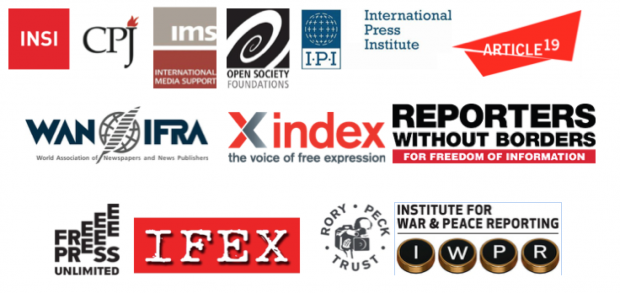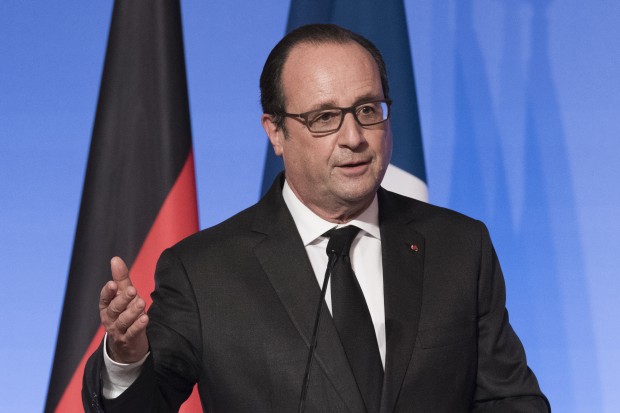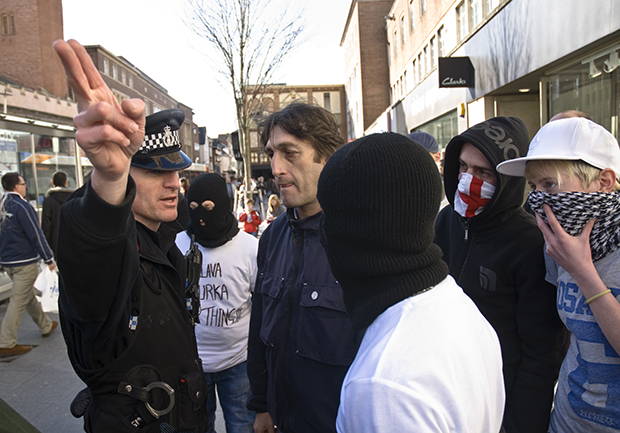25 Jan 2016 | Afghanistan, Asia and Pacific, Campaigns, mobile, Statements

In response to the attacks on Tolo TV on 20 January, in which eight people have been killed and 30 others injured, we stand in solidarity with the Afghan media community. We condemn this and all other attacks on Afghanistan’s journalists unreservedly and applaud their courage to stand together undeterred by those who seek to silence them. We want to tell our colleagues throughout Afghanistan they are not alone; the international community is behind them. The journalists and media workers of Afghanistan are playing a leading role in working fearlessly to ensure that the voices of violent extremists do not dominate the news agenda. We remain ready to help them in this perilous endeavour.
Signed by (and including links to additional statements on the Tolo attack from these organizations),
Article 19, UK
Committee to Protect Journalists, USA
Free Press Unlimited, Netherlands
Index on Censorship, UK
Institute for War and Peace Reporting, UK
International Freedom of Expression Exchange (IFEX), Canada
International News Safety Institute UK
International Media Support, Denmark
International Press Institute, Austria
World Association of Newspapers, France
Open Society Foundations, Program on Independent Journalism, UK
Reporters Without Borders, France
Rory Peck Trust, UK
27 Nov 2015 | Europe and Central Asia, France, Mapping Media Freedom, mobile, News and features

Editorial Credit: Frederic Legrand – COMEO / Shutterstock.com
Even before the attacks on Paris on 13 November were over, French President Francois Hollande declared a nationwide state of emergency giving authorities additional powers in the name of protecting citizens and combatting terrorism. But since the attacks, concerns have been raised for press freedom prompted by the cancellation of a regular radio segment by journalist Thomas Guénolé.
A few days after the events of 13 November, Guénolé devoted his daily morning commentary piece on RMC radio to what he perceived as the failings of the French security services and police. On the same day, the Interior Ministry called Philippe Antoine, RMC managing editor, to demand the radio station air a corrective to points Guénolé discussed during his segment, which the ministry would pen. “Interestingly, the corrective was not going to appear as a corrective emanating from the Interior Ministry but as the correction of an inaccurate information emanating from RMC,” Guénolé told me.
The proposed corrections were in relation to Guénolé’s discussion of claims reported by various news outlets, including that France had known since August 2015 that IS planned to attack a rock concert in France and that Turkish authorities had warned France twice this year about Omar Ismaïl Mostefaï, one of the assailants of the Bataclan massacre.
Guénolé called for a parliamentary investigation which should, if these claims were true, prompt the resignation of the highest ranking French officials, including Bernard Cazeneuve, France’s Minister of the Interior.
Guénolé also repeated information published by La Lettre A, which claimed only three out of 50 members of the Parisian Brigade de recherche et d’intervention (an anti-gang unit, which is to intervene in hostage situations) had been on duty after 8pm on the night of the attacks. On 19 November, the special adviser to France’s interior minister, Marie-Emmanuelle Assidon, took to Twitter to say the information contained in La Lettre A was false but recognised she had not read the article. “[N]o one but Thomas Guénolé trusts your info,” she added in her tweet.
“I have repeatedly asked Place Beauvau for a denial,” Marion Deye, editor at La Lettre A, told me. “I haven’t had one.” Neither have Le Monde or the AFP, also quoted by Guénolé.
“We published a very factual piece of news on the Monday following the attacks, at a time when any type of criticism was not welcome,” Daye said. “However, what we published was not a criticism, just a report. The most absurd thing in this whole story is that no one knows what Place Beauvau denied when they spoke to RMC. I think what was really problematic for some was that Guénolé brought up the resignation of Cazeneuve.”
On Friday 20 November, Guénolé was informed that his daily column was cancelled. In an email, the RMC managing editor wrote: “The Interior Ministry and all the police services invited on air have refused to appear on RMC because of inaccuracies in your column. Most sources of our police specialists have gone silent since Tuesday, putting in jeopardy the work that our editorial team does to find and verify information.”
Guénolé described the actions against him as both a “boycott” and an “embargo”.
“One would expect a media outlet to back up its journalist and not to have too strong a dependency vis-à-vis institutions,” he said. “My particular case doesn’t matter so much. What is unacceptable is that the Interior Ministry seems to have pressured RMC because they were displeased with what a journalist said on air in the context of the state of emergency.”
The firing of Guénolé happened on the on the same day the Assemblée Nationale voted to extend the state of emergency from 12 days to three months. Measures to control the press were initially proposed by 20 socialist MPs led by Sandrine Mazetier on the basis that the coverage of the January 2015 attacks in Paris – especially by news channel BFM-TV – had endangered the life of hostages who were hiding in a Hyper Casher supermarket. Such a measure would be highly problematic. As Mathieu Magnaudeix, a journalist with the investigative website Mediapart, put it to me: “If we were to end up with an authoritarian power, which by now doesn’t seem to be out of the question, what could they do with a law that allows the control of the press?”
Thankfully, the press control measures were later dismissed and it was made clear that even Hollande was strongly opposed. Regardless, it is apparent journalists still aren’t safe.
The proposed law does, however, extend and harden house arrests that are allowed under a state of emergency, enables members of the police force to carry their weapons while off duty, gives stronger powers to the authorities to carry police searches that are not approved by a judge. While these cannot be carried out in the workplace, police searches can take place at the house of an MP, lawyer, a judge or a journalist.
This kind of anti-terror legislation, as we have seen in the UK, could have further negative consequences for journalists covering terrorism.
Mapping Media Freedom
Click on the bubbles to view reports or double-click to zoom in on specific regions. The full site can be accessed at https://mappingmediafreedom.org/
|
23 Oct 2015 | Academic Freedom, Counter Terrorism, Europe and Central Asia, mobile, News and features, United Kingdom

Police move on the English Defense League members in Exeter City Centre. Credit: Clive Chilvers / Shutterstock.com
There are a few techniques you can use to spot whether someone has slightly dodgy views on the world.
My favourite is the hand-chopping test. Imagine, if you will, that you find yourself debating on a panel with a media-friendly community activist. He was very jovial in the dressing room, knows all the right words about the European Convention on Human Rights and a little bit about the emancipation of women. All the nice things. But something seems a bit shady. You’ve heard he’s associated with some rather dubious types. Try this: ask if they think thieves should have their hands cut off. If they say: “What an odd question. Of course not!”, they’re probably fairly normal people, but they won’t be your friend because they reckon you’re probably Islamophobic. But if they start waffling about the “Sharia being properly implemented… in an Islamic State the Sharia would necessarily… something something scholars…” etc, you are in all likelihood sharing a stage with someone who’s a bit, well…
Well what, exactly? Dodgy, yes. The test has served to establish that much. But does it mean they’re probably going to join the Islamic State immediately after you’ve finished your panel debate? Or encourage others to do so?
Probably not. We don’t really know.
Take another example. You’re at a bus stop late at night when you overhear a middle-aged man next to you railing against refugees to a young woman. Is he simply an anti-immigrant little-Englander? What if he starts explaining that the current refugee crisis has been caused not by Assad or IS, or oppressive governments in say, Eritrea, but by the machinations of “Rothschild Zionists” who are determined to flood Europe with dark-skinned people in order to pollute the continent’s Aryan bloodstock?
The UK government would class the beliefs outlined above as “extreme”. Indeed, in its newly-outlined counter-extremism strategy, it focuses almost exclusively on Islamism and neo-Nazism, which might come as a relief to anarchists, deep greens, animal rights activists and physical-force Irish republicans.
I’m not about to debate the merits of the term “extremism” itself. Yes, “extreme” is by its nature a relative term, and things change over time: the Prussian secret police who spied on Karl Marx in London as he wrote Das Kapital surely would have identified him as an extremist, but could not have possibly imagined his ideas would become so very prominent in the corridors of mainstream academia a century later.
The ideas of extreme Islamists and the far right, it is probably reasonable to say, are far from the mainstream of British society. And violence is carried out in their name. These seem reasonable assertions.
The question then is whether the government should do something about their existence. And if so, what?
The new counter-extremism strategy does at least attempt to identify specifics of what extremism might be and also shows some actual knowledge of the identified problems as specific political projects rather than floating notions.
But it’s still not entirely clear whether the ultimate aim is to prevent acts of terrorism carried out by extremists or to prevent general wrongs.
It is of interest, for example, to note that violence against women and girls, including genital mutilation, is identified. But I’m not sure that the “root causes” can be linked simply to the forms of extremism mentioned in the strategy document.
There are other issues that will also raise concern for those interested in free expression.
In an age when stories about who can and cannot speak on university campuses have become a staple of discussion, the government’s assertion that it expects “student bodies such as the NUS to avoid providing a platform for extremist speakers” feels like yet another incursion onto the idea that universities should be free spaces.
The suggestion that “the government will challenge broadcasters whenever extremists have been given a platform to preach harmful messages without critical challenge” appears to be moving beyond the existing role of Ofcom in promoting balance on the airwaves.
This is underlined by the pledge to “legislate in this parliament to ensure Ofcom’s existing powers to immediately suspend TV services that broadcast unacceptable extremist material also extend to all radio services” and to “consider changes” to regulation around shows that appear on the web.
We ultimately return to the challenge of our jovial preacher on the panel debate or our bus-stop Streicher.
As individuals and as a society, what do we want to do with them? Convince them that they are wrong and that liberal democracy is the way to go? The government suggests it will “act with confidence, unapologetically defending our shared values and robustly confronting extremists”.
This is important, certainly, and is something that must be put into practice in places such as prisons where the path to radicalisation and possible violence is at its clearest.
But it’s crucial that is seen as an act rather than an idea: the crime is to plant the bomb or recruit, fundraise for violence in the name of the Islamic State, or attempt to foment race war longed for by Nazis. The crime cannot be simply to believe in the Islamic State or the race war. We come back (as we so frequently do) to John Stuart Mill’s harm principle: “The only purpose for which power can be rightfully exercised over any member of a civilized community, against his will, is to prevent harm to others.”
29 Jun 2012 | Egypt, Middle East and North Africa, Opinion
Cairo’s Tahrir Square exploded in joyous revelry and fanfare on Sunday afternoon after Counsellor Farouk Sultan, the Head of the Elections Commission announced the results of the presidential run-off vote in a nationwide televised address. Counsellor Sultan named Muslim Brotherhood candidate Mohamed Morsi the winner with 51.73 per cent of the vote and by a slim margin of 800,000 votes. The announcement ended days of speculation over the results of a vote that has polarised Egypt and accentuated a decades-old secularist/Islamist divide.
Supporters of Morsi’s opponent Ahmed Shafik meanwhile expressed their anger and shock at his defeat. Some insisted that “the result was incorrect” while others said they would pack and leave Egypt altogether. Most people in Shafik’s camp were secularists who had voted for the former regime man (the last prime minister under Mubarak) out of fear that Islamist rule would mean intolerance and the stifling of freedoms.
The victory of a conservative Islamist and long-time Muslim Brotherhood member has fuelled concerns about the rights of minorities and women, freedom of expression and possible restrictions on art and creativity.
The secularists’ fears are not totally baseless: In recent months, several lawsuits filed by Muslim hardliners against artists and a Coptic businessman have threatened to curtail free expression. Coptic business tycoon Naguib Sawiris was twice accused by ultra- conservative Islamists of “blasphemy and insulting Islam “after he posted a cartoon on Twitter of a bearded Mickey Mouse and a veiled Minnie. The courts dismissed the charges on both occasions on grounds that “the plaintiffs lacked legal standing”.
Meanwhile, comedian Adel Imam and several other artists who worked with him were charged with “showing contempt of religion” in three films made in the early nineties, including the 1994 film “The Terrorist” (in which Imam played the role of a Muslim fundamentalist). The ultra conservative lawyer who filed the lawsuit accused Imam of mocking Muslim symbols like the beard and the white robe or “gallabeya” traditionally worn by devout Muslims.
While the case against Imam was later dismissed, it did trigger an outpouring of anger from liberals and intellectuals who expressed fears that such conservatism could drag Egypt “back to the dark ages”. Many intellectuals, writers and artists worry that the sweeping tide of Islamism may lead to greater censorship of their work and curb creativity and free expression.
They have demanded that Egypt’s newly elected president make clear his position on freedom of speech and creativity.
“We want a promise from him that creativity won’t be judged on religious principles,” said secular writer Ahmed Al Khamisi. “We want him to pledge not to censor artists nor stifle their freedom to create.”
Activist Dalia Ziada has also expressed her concern that Morsi would “try to take actions against human rights and freedoms, by orders from God.”
While Morsi has not denied his intention to implement Islamic Sharia Law, reiterating in his campaign speeches that the “Qur’an is my constitution”, he has sought to allay the concerns of Egypt’s liberals by promising to protect freedoms and the rights of minorities and women. He has also withdrawn from the Muslim Brotherhood and pledged to appoint a Christian woman as Vice-President.
In his first televised speech after winning the election, he said. “Egypt is for all Egyptians; all of us are equals in terms of rights.”
He has also promised to fulfil the goals of the revolution including freedom, democracy and social justice.
Egypt’s military rulers have meanwhile declared themselves “the guardians of the revolution and protectors of a secular, democratic state council”. They recently introduced supplementary constitutional amendments that consolidate their grip on power. The amendments give the army sweeping legislative and budgetary powers including control over the drafting of the country’s new constitution. All this, while limiting the powers of the newly elected President dramatically.
With tight control from the military and all eyes closely watching him, Morsi is in for a tough time to prove his mettle. Revolutionary activists are monitoring his performance in his first 100 days in office through a new internet application dubbed “The Morsimeter”. They have also been piling pressure on him through continued protests in Tahrir, demanding that he wrest more powers from the military. Satisfying all political forces — the youth revolutionaries, the military authority and the Islamist groups who want Sharia law implemented, may be a near- impossible task. One thing is certain though: divorcing religion from politics will have to be a vital concession for Morsi to make if he wishes to win the support of the secularists who initiated the revolution.
Journalist Shahira Amin resigned from her post as deputy head of state-run Nile TV in February 2011. Read why she resigned from the “propaganda machine” here.



